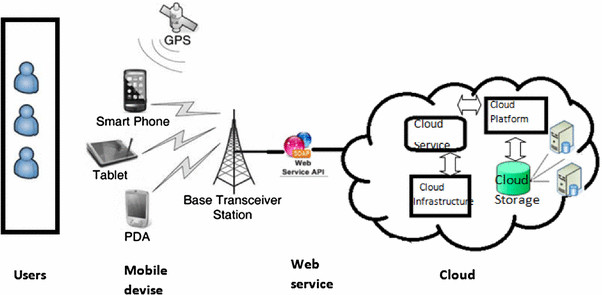Introduction
MCC is an architectural solution that integrates the computing power of mobile devices such as smartphones and tablets with cloud-based resources. MCC's mobile devices may supplement resources from multiple cloud-based accounts remotely rather than locally as a result of computational augmentations. The combination results in a new type of mobile computing experience that is smooth on any device or when switching between devices.
Because it includes a built-in web browser, Mobile Cloud Computing allows for faster application execution. Applications can be executed even when a desktop or server-based applications are not available. It's simple to operate and employs a wide range of one-handed devices at simultaneously.
MCC Architecture
Two major components comprise the Mobile Cloud Computing Architecture.
The virtualized computing core (VC), a hosted cloud service that hosts multiple cloud computing services required to run on the mobile device, is the first major component.
The client-side application (CSA) is the second key component: it runs the MCC applications on the host device. When running applications for a customer, the CSA employs a cloud execution service. Various cloud services can be used to augment the MCC application's capabilities when it is running in the CES.
Types Of MCC
- Distant Immobile Cloud Computing
- Hybrid Cloud Computing
- Distant Mobile Clouds
- Proximate Immobile Computing Entities
- Proximate Mobile Computing Entities
Advantages
- Cost-Effective
- Scalable,Flexible
- Affordable
- Faster execution
Disadvantages
- Data loss or theft.
- Data leakage
- Account or service hijacking.
- Insecure interfaces and APIs.
Finally, MCC is an innovative approach to mobile computing that gives users more capabilities and flexibility. By integrating the processing power of these devices with that available in the cloud, MCC allows users to fully utilize the capability of their smartphones or tablets. This hybrid method can provide consumers with additional capabilities not available on either device alone, as well as services not available on either device alone.
MCC uses cloud computing and mobile devices to create an environment in which users may access the capabilities of both of their devices without requiring separate servers. Because MCC enables more user engagement with each device, this hybrid technique can leverage resources from a single client rather than relying on numerous nodes in the server-client relationship.
Businesses can avoid risks and fully profit from cloud computing by adopting cloud security best practices and implementing the right security technologies.
Cloud computing offers numerous benefits, including cost savings, more flexibility, and a lower risk of downtime. These benefits, however, are only available if your architecture is well planned. It is suggested that a professional cloud architect be brought on board before beginning a new MCC project, especially with existing customers.
Happy Coding! ☕🍃






Top comments (4)
Čekám na tramvaj v Praze na Václaváku, zima jak v psírně, a tramvaj nikde. Z nudy jsem vytáhl mobil a zkusil spinogambino. Kamarád říkal, že to sype. Byl jsem skeptický, většinou tyhle stránky jen berou prachy. Ale hodil jsem tam pár korun. Automaty se točily plynule i na datech. Nejdřív nic, ale pak mi padl bonus. Vyhrál jsem akorát na pivo a večeři v Lokále. Tramvaj nakonec přijela, ale náladu jsem měl už mnohem lepší.
This introduction aligns well with Wikipedia’s explanation of mobile cloud computing, where computation and storage are offloaded from resource-limited mobile devices to scalable cloud infrastructure to improve performance and continuity.
By leveraging remote processing and synchronized cloud accounts, MCC enhances productivity, reduces device constraints, and enables seamless experiences across multiple devices.
The same cloud-backed efficiency is visible in services like tnt sim registeration, where digital platforms simplify activation and management without relying on physical processes
Mobile Cloud Computing reflects what Wikipedia describes under mobile computing and cloud computing—offloading storage and processing from resource-limited devices to the cloud enables smoother performance, scalability, and seamless cross-device experiences.
By leveraging remote servers, MCC improves battery life, supports complex applications, and allows users to stay productive regardless of hardware constraints.
This same reliance on cloud-backed continuity is visible in services like globe sim registeration, where centralized systems ensure accessibility, reliability, and a friction-free mobile user experience
I really enjoy how Geometry Dash doesn't require an internet connection to play the main levels.